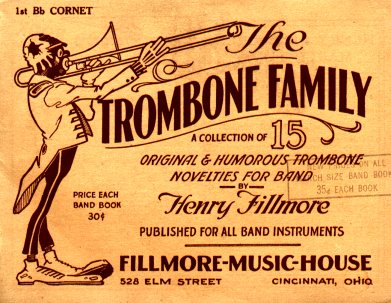Fillmore, The Klaxon
Marches are not uniquely American, but they seem to go hand-in-hand with our expressions of patriotism.
If asked to name two composers of marches, I suspect almost everyone would immediately think of John Philip Sousa and then struggle to come up with a second name. There are not many instances where a composer so dominates a genre, at least in terms of public recognition.
Many very well-known composers have written marches—composers like Mozart, Rossini, and Beethoven to name just a few. But marches were incidental to their overall work. Other composers had a profound impact on the march genre—American composers like Sousa, Karl King, and Henry Fillmore.
 Fillmore was born in Cincinnati in 1881 and graduated from the Cincinnati Conservatory of Music. He became a successful band leader, conducting circus bands and taking the Shriners Temple Band to national prominence. He had a particular love for the trombone and, upon inheriting of the family business, Fillmore Music House, he shifted its focus to band and orchestral music.
Fillmore was born in Cincinnati in 1881 and graduated from the Cincinnati Conservatory of Music. He became a successful band leader, conducting circus bands and taking the Shriners Temple Band to national prominence. He had a particular love for the trombone and, upon inheriting of the family business, Fillmore Music House, he shifted its focus to band and orchestral music.
While we often associate marches with military music, their energy and excitement also makes an appropriate accompaniment to circus thrills. The circuses of Ringling Brothers and P. T. Barnum enjoyed enormous popularity in late 19th- and early 20th-century America, and Fillmore’s circus marches were well-known. In contrast to military marches, circus marches often move at a faster tempo, too fast for marching but not too fast for trapeze artists and clown cars.
Fillmore retired to Miami in 1938 after being told he had only weeks to live. The doctor was eventually proved right more than 900 weeks later. During that time he worked with many high school bands and the bands at Florida’s major universities.
Trombone players gravitate to Fillmore because of his musical trademark, the “trombone smear.” But horn players like me appreciated The Klaxon (1930) as one of the few marches that give the French horn a moment to shine.



